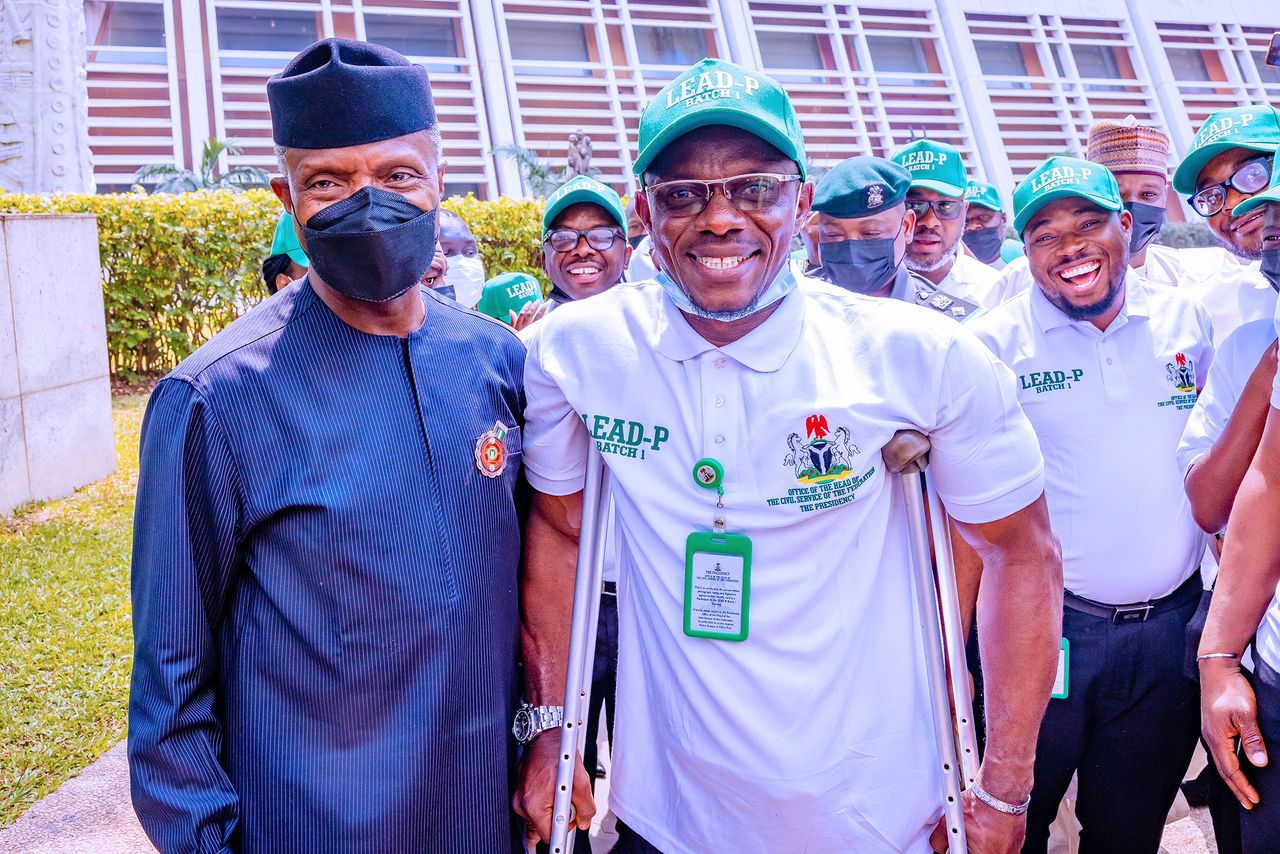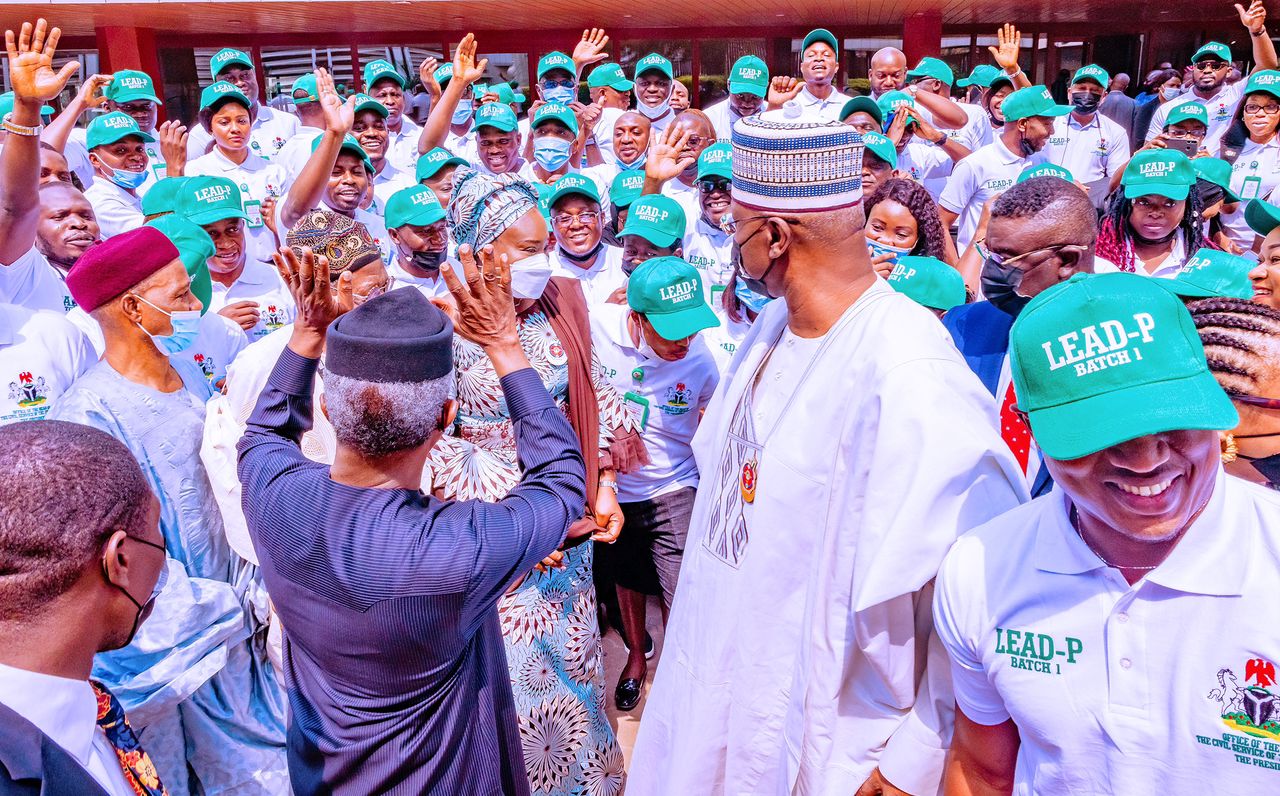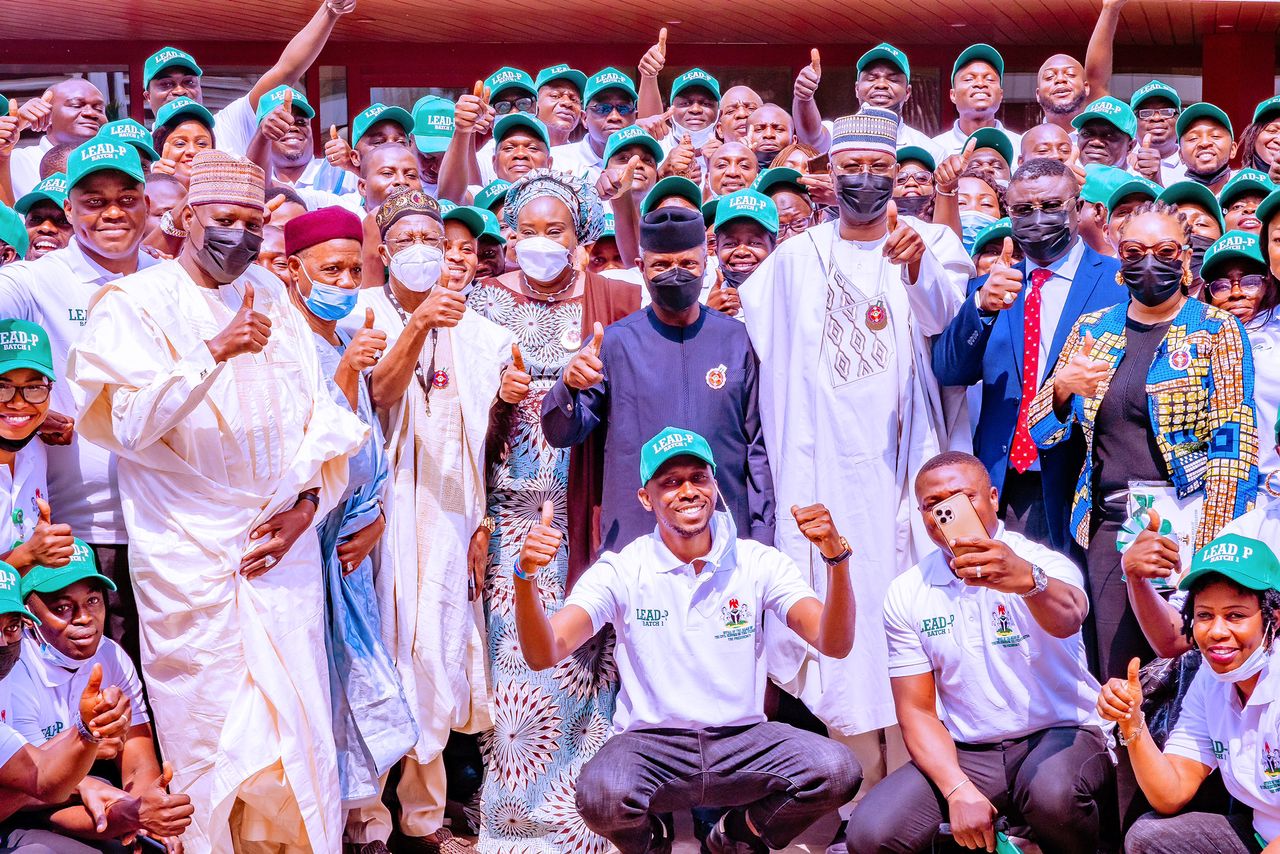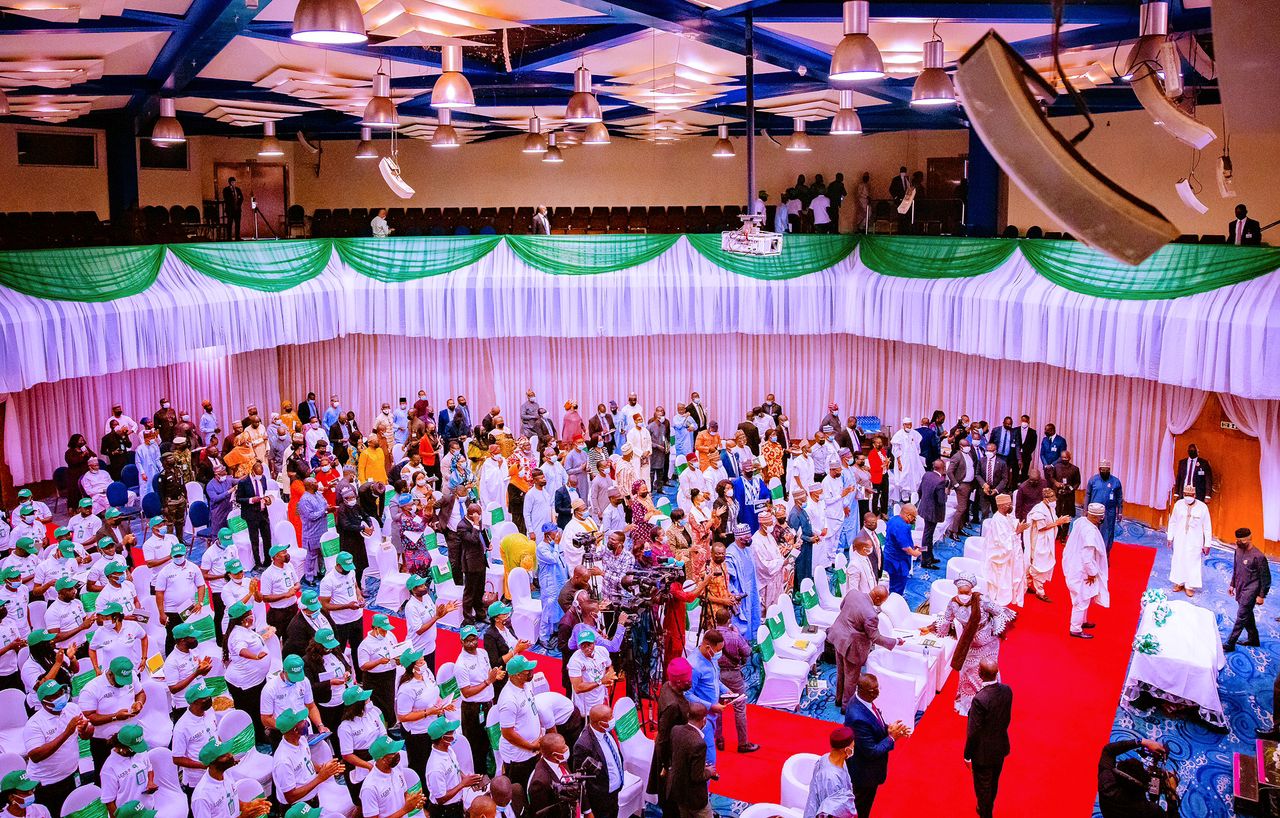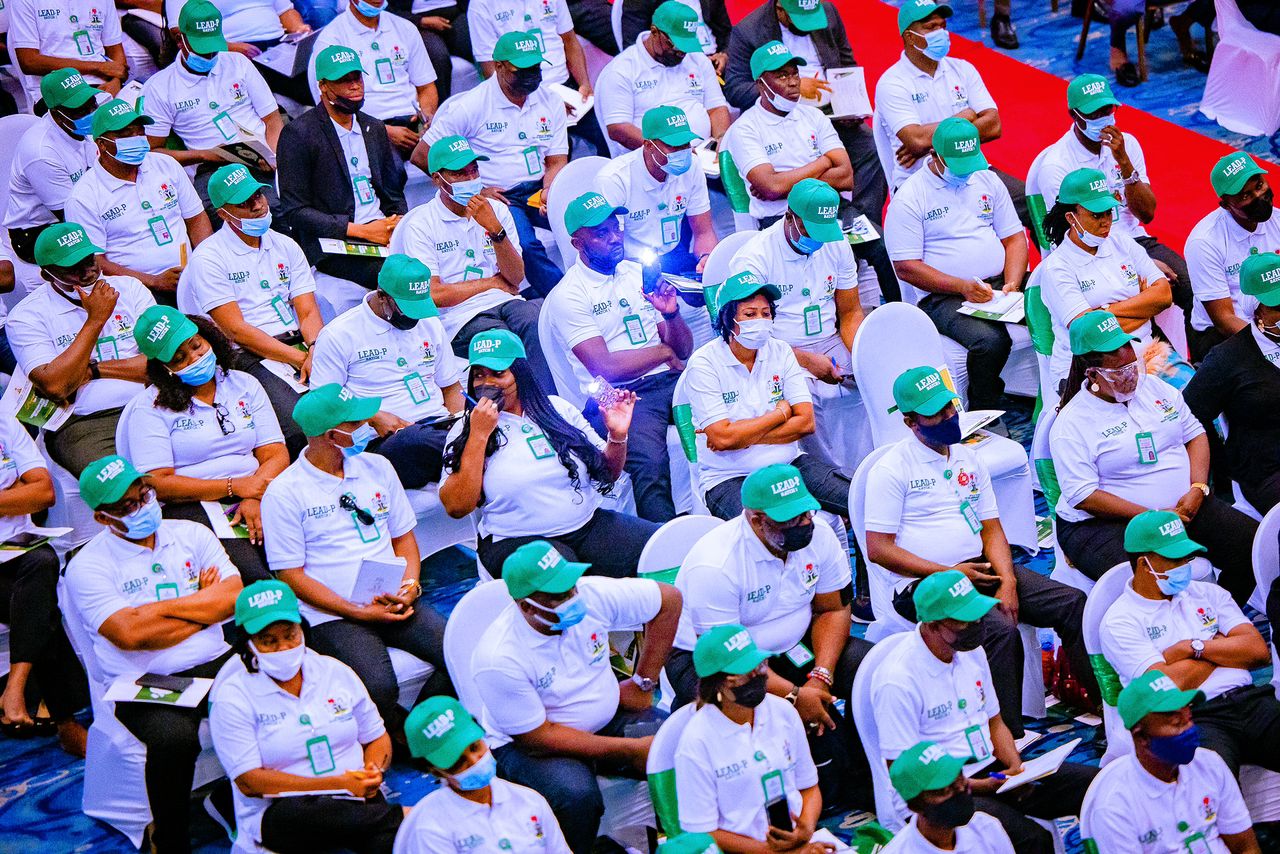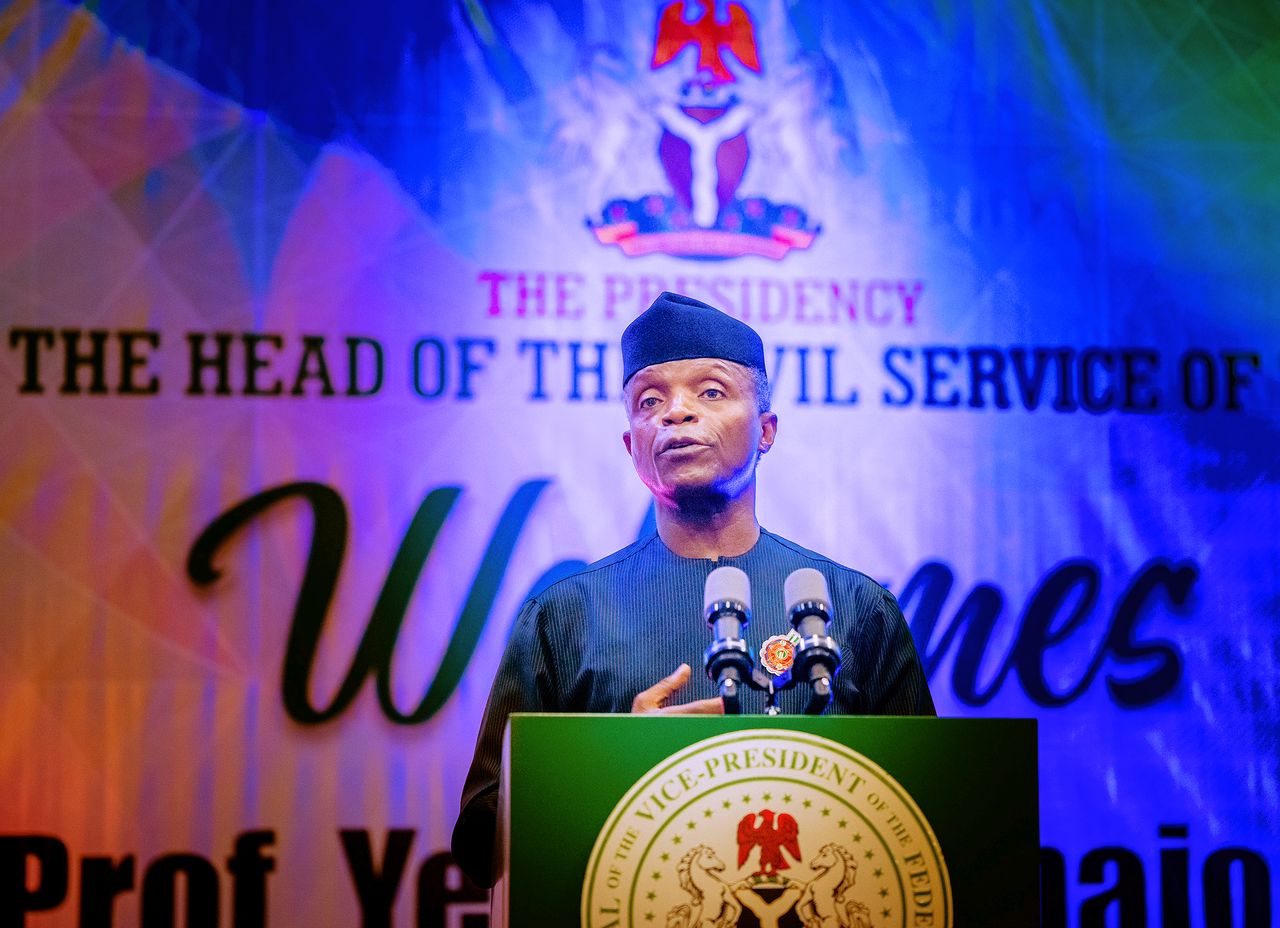Leadership Enhancement & Development Programme (LEAD – P) Organised By Head Of Civil Service
SPECIAL LECTURE DELIVERED BY HIS EXCELLENCY, PROF. YEMI OSINBAJO, SAN, GCON, VICE PRESIDENT OF THE FEDERAL REPUBLIC OF NIGERIA AT THE LEADERSHIP ENHANCEMENT AND DEVELOPMENT PROGRAMME (LEAD-P) ORGANISED BY THE OFFICE OF THE HEAD OF THE CIVIL SERVICE OF THE FEDERATION ON THE 13TH OF JANUARY, 2022
PROTOCOLS
I think the Head of the Civil Service of the Federation and her team deserve our commendation for the revamped and improved successor plan 2021 to 2025 to the Federal Civil Service Strategy and Implementation Plan 2017-2020.
The approval of the revamped plan by the Federal Executive Council last year reflects the strong determination of the Federal Government to reposition the Federal Civil Service to enable it to play its pivotal role in national development. And of course, LEAD-P is an integral part of the three-pronged training components of the plan, the other two being the Structured Assessment Based Training Programme (SMART-P) and the Induction Training. Well done for the excellent efforts and progress made so far.
Again, we must commend you for this first Leadership Enhancement and Development Programme. From all I have been told this first cohort of the Lead-P are some of the brightest and best in the Civil Service, having earned their place in the cohort by merit.
I think the best of all is the commendation already given for your hard work and diligence by all who have spoken especially the Head of the Civil Service. Congratulations!
I am to speak on Strategic Leadership – The Essential Skills. I think the big question for me has always been whether it is even possible for a nation to develop beyond the capacity, professionalism and integrity of its Civil Service?
The empirical examples of other countries that we have especially late developers show that a highly capable and professional bureaucracy is essential for successful development.
This was certainly the case for Japan, Korea, Taiwan and Singapore amongst others, just as it is for Brazil, China and India, all of which have well developed and professional bureaucracies.
And this fact should not be too surprising given the roles and responsibilities of the Civil Service namely to design and implement policy, regulate economic activity, and provide public goods including infrastructure and social services. Very often we hear people say that Nigeria’s problem is not plans and policies, but rather that of a lack of capacity or failure to implement.
The subtext of such comments is simple; the bureaucracy is the key. If it works, everything works. If it fails, plans and policies are hardly worth the paper they are written on. The bureaucracy literarily holds the future of the nation in its hands.
There are several theories, case studies and researches on Strategic leadership and I am quite certain that management and leadership teachers will be much better suited to deliver the most informative lectures on this crucial subject.
Since I am not such an expert, I think it might serve our purposes better if I share with you my own thoughts on some of the Strategic Leadership skills that are essential especially for leaders such as yourselves in our Civil Service and our country.
First let me say that strategy as far as the Civil Service is concerned, requires first a clear detailed understanding of government’s policies. As is often the case, politicians come into office with a vision for the future captured first in their manifestoes or subsequently in their policies and plans.
Some of those ideas are at the rudimentary stages of articulation. It may then be the lot of the bureaucrats to further develop these thoughts and ideas. Whatever the circumstance, the strategic leader must fully grasp the policies and plans of the government. This if you will permit me, requires serious study and inquiry.
To be effective at this stage of the assignment, the bureaucrat must apply multidisciplinary knowledge and skills. Some can be taught, some can be communicated through lectures of the sort that you may have gone through, but self-development is perhaps the most important. The skills that you are giving yourself through personal study.
Strategic thinking and planning are mere buzzwords if, for example, the bureaucrat does not study and understand the Medium-Term Expenditure Policy and the Fiscal Strategy Paper, and the budget in any given cycle. There’s no way that one can apply skills without a fundamental understanding of these policy papers of government, especially when it comes to the economy.
Second, strategic leadership is not an individual phenomenon, it has to be systemic and organizational. Strategic thinking and action require collaborative thinking, (especially for the Civil Service which is a huge organisation), also planning and implementation.
An essential skill for a strategic leader is the ability to think, plan, work and deliver on plans and policies with others, often across departments and agencies. So, for example, central to our economic policy is a diversified economy, job creation, wealth creation and resource mobilisation. Those are key features of our economic policy. All of these depend on robust private sector participation.
To emphasise the primacy of the private sector, our new National Development Plan envisages an investment commitment of N348 trillion over the plan period of which it is expected that the government at all levels will come up with about N49.7 trillion or about 14% while the private sector is expected to invest N298 trillion or about 86% of all that is required during that implementation period.
So, the strategic leader must acknowledge the stark reality that without the private sector we do not have an economic plan. This must then inform the way he or she thinks, plans and acts.
The strategic leader must recognize that the whole point of the Civil Service and government agencies must be to facilitate and enable individuals, corporations and other commercial entities sometimes working with government, to develop industries, do business, trade, render services, and invest.
Strategic leaders must envision strategies for ensuring that all government agencies and departments work together to achieve this objective. Any failures along the chain means that the overall objective is delayed or denied.
So, for example, we know that persons wishing to do business may need to incorporate their business, seek NAFDAC approval for their products, register a patent if they are using proprietary processes or machines, or trademarks for legal differentiation from other products. They may need to import components for their manufacturing or export their products. Every one of these steps involves one or more government agencies. So, from the CAC, through to the trademark’s office, NAFDAC, Customs and other agencies and regulators, it is the business of Civil Service leadership at the strategic level to fashion the fastest, most efficient ways to ensure that commercial people and investors can do their business unhindered.
Government policies on diversifying the economy, creating jobs, resource mobilisation are useless if there is no collaborative thinking, and action for implementation by the leadership of the Civil Service.
The question that strategic leaders must always ask is what is the end-to-end implementation strategy? How many agencies should be involved? How many steps are to be taken? Are there ways of shortening the processes, or the time it takes to process applications?
Finding the answers to these questions unlocks the objective of enabling the private sector, in the case of our own National Development Plan to contribute its 86% to the National Development Plan.
The role of government agencies as licensors, regulators, revenue generators only make sense when operators understand that the bigger picture is to provide the most auspicious environment for the private and non-government sectors to operate.
The strategic thinker must know that we are called to not just to tend to the golden goose; we are supposed to tend to it, but in the process, we mustn’t strangle the goose that will lay the golden eggs. If in the process of trying to ensure that the golden goose is regulated, we strangle it, then we get no eggs whatsoever.
This approach applies to every component of government policy, not just the economy. Our commitment to lift a hundred million out of poverty over the next 10 years as the President has laid out, our social investment programmes are massive policy initiatives but they require a full understanding and strategic interpretation by the Civil Service for effective implementation.
This applies even to the routine functioning of government. So, the strategic leader may ask, “why should it take four months to process the first salary of a new entrant into the Civil Service?” When we joined the Civil Service, as President and Vice President, after about 3 months of waiting for our pay to come in, the President asked me whether I had been paid, and I told him, “Mr President, I have not been paid,” and he responded and said, “I have not been paid either!”
The question we must ask ourselves, is “why does it take so long?” What are the steps and processes? Why do they take so long and what can be done? Why should it take so long to process pension payments and all those verifications? What do we need to do to ensure that these processes are seamless, efficient and speedy?
What does the Civil Service require to function optimally? What sort of training is required? What does it require to have a Civil Service that can run the economy and social services of a nation of 200million people? What remuneration makes sense to attract and retain talent? There is no point pretending that you can attract quality people and retain them if you don’t pay well.
Let me quickly give a quick example of what happened with the Judiciary in Lagos State. When we assumed office in 1999, as Attorney-General, one of the major problems we had was with the Judiciary. A justice sector committee ran a survey of legal practitioners within our court system, and we asked 200 legal practitioners about the integrity of our Judiciary. 89% of the lawyers said our Judiciary at the time were notoriously corrupt. At that time, no judge/magistrate had ever been sacked or even reprimanded in the history of the State.
I then held a meeting with some of the senior judges to look at what the issues were. We started with their pay and at the time judges were earning around N46,000 per month and we asked several questions like, “you have 3 children in school, two abroad and one in Nigeria.” We tried to do the figures and one of the judges tapped me on the shoulder and said, “learned Attorney-General, stop all this, you know that this doesn’t make sense, you know the pay doesn’t make sense. You pretend to pay us and we pretend to work!”
So, it was evident to us, and it was evident to me that we were not paying them enough. I visited a judge who had retired for almost 10 years, in a place where he lived which was someone’s boys’ quarter in Lagos. He had two rooms, one had stacks of books. I thought to myself, how does anyone come into the Judiciary knowing that they are going to end up this way? It simply doesn’t make sense.
We decided then that we were going to take a whole look at that sector, remuneration, discipline, merit in terms of appointment of judges and we did all of that.
I will focus on the issue of discipline and remuneration; one of the greatest fears of a judge was that they would leave office without a home, because you can’t practise law once you leave office as a judge – you can’t appear in the courts, you are prevented by law from doing so. We decided that we must provide accommodation for judges which is theirs as soon as they become a judge. You choose your location between Ikoyi, Lekki or Ikeja, and then we brought in human resource experts who looked at the remuneration and then we positioned the remuneration in such a way that it would be difficult for the judge to say that he/she was not well paid. We ensured that remuneration was adequate.
We then looked at the question around merit, how do we attract the best? We were able to attract the best first, because the remuneration was good and then, we looked at the question of discipline. How do we ensure that if a report is made about judicial corruption, we are able to ensure that the report is carried up to the NJC, get a decision and take action? On account of the fact that we were able to carry out these extensive reforms, we were able to ensure that the discipline of judges took place. About 22 magistrates in the second year were sacked for various acts that were considered contrary to the rules, about 3 judges lost their jobs.
In 2007, the World Bank did a similar survey with us, asking the same questions about integrity in the high courts of Lagos, 0% of our legal practitioners said our judges were corrupt.
What happened? It wasn’t that these people suddenly found revelation, became converts and changed. No! They realised first, that they were well remunerated, they had reasonably good accommodation, and also that there would be consequences for misbehaviour.
I think that as part of our thinking through this process, we must be able to arrive at what makes sense. At the moment, almost 2/3 of our budget is on remuneration and emolument and recurrent expenditure. The question then is, are we getting the best and how do we restructure, reorganise ourselves, finances and remuneration in order to attract the best? There is no point in having a Civil Service that is not functional, because it is the engine room.
There is no question as the late Prime Minister Lee Kuan Yew of Singapore said that “petty power invested in men who cannot live on their salaries is an invitation to misuse that power” and that “adequate remuneration is vital for high standards of probity in political leaders and high officials.” But a good pay is not enough, ensuring accountability, discipline and adequate training are as important.
Let me commend the vision, focus of the Head of the Civil Service and I think this is an excellent start to the big question of how we ensure that we have a Civil Service that can do the work that is required for the largest economy in Africa, and perhaps on the way to becoming one of the most significant in the world.
So let me end by repeating something I said in 2017 at the signing ceremony of Executive Order 001 – at the time, I was speaking about the functioning of the Civil Service. I said, everything that happens in the public service has an impact on the lives, livelihoods and the future of our country. Every time a civil servant says “come back next week” to someone for something we can do today, we postpone the prosperity of one person but in reality, we postpone the prosperity of so many who would have earned something from that business.
Every time that a public officer is an obstacle to business in anyway, he attacks the prosperity of our economy and he attacks the prosperity of our future. Great economies and great nations, and the abundance of those nations and communities are created by men and not spirits. What makes a nation great and those who make nations great, are you and I, and I mean the Civil Service. The Civil Service is by far and away, the most important component in developing any nation.
Let me add a word or two of advice; I think it is important for government to ensure in addition to the training of LEAD-P participants, that they have role models and are well mentored including by senior public servants in various MDAs as well as by leaders of the private sector. It is important that there should be an intentional mentorship programme that puts this cadre of people through senior public servants that have done well and also in the private sector.
They will be greatly encouraged by seeing those who have succeeded by staying the course and garnering the attributes of leadership over the years. Similarly, it is important that LEAD-P participants be shielded from what may sometimes be the envy and political machinations of old school civil servants who resent high flyers. Part of what may be required to be done is by ensuring that others are given the same sort of training and given a sense of inclusivity in all of what is being done. The Head of Service and Permanent Secretaries have their work cut out for them in this regard.
Let me end by saying that our future development as a nation requires a public service that is motivated, efficient and dynamic and I am confident that through the FCSSIP we are going in the right direction.
I urge participants in the LEAD-P programme to take full advantage of the opportunities and exposure given to them so that they can restore the trust of the political leadership and the citizenry in the civil service and indeed the public service at large.
Thank you very much for listening.



